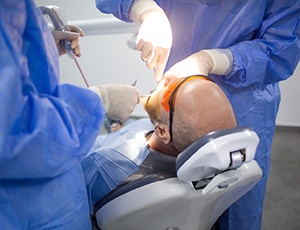Wisdom Tooth Extraction – Plano, TX
Removing Unneeded, Problematic Third Molars
Many people between the ages of 17 and 25 are told that they need to have a wisdom tooth extraction. Performing this procedure is often a must if you want to avoid unnecessary pain and dental damage. At Legacy Trails Dental of Plano, our helpful dentists will explain each step of the extraction process so that you won’t have anything to worry about. Set up a consultation with us today if you have concerns about your wisdom teeth.
Why Choose Legacy Trails Dental of Plano for Wisdom Tooth Extraction?
- Same-Day Emergency Appointments
- Relaxing Sedation Dentistry
- Gentle & Friendly Team Members
What Are Wisdom Teeth?

You’re probably already familiar with the term “wisdom teeth”, but what does it actually refer to? Quite simply, it’s the name for the third set of molars that usually erupt during the late teens or early twenties – long after all of your other teeth have already come in. While it’s common to have a full set of four wisdom teeth, there are plenty of people who have less than that, and in rare cases, there might not be any wisdom teeth in the mouth at all.
Why Do Wisdom Teeth Need to Be Removed?

Wisdom teeth can sometimes cause a number of problems when they try to erupt, such as:
- Becoming impacted under your gums.
- Causing chronic pain toward the back of your mouth.
- Moving your other teeth out of place.
- Increasing your risk for oral infections and tooth decay.
- Causing cysts to form.
Since wisdom teeth aren’t actually needed for a healthy smile, it’s best to have them removed if they’re causing any oral health complications. (That said, there are circumstances where keeping your wisdom teeth might be possible; we can advise you on the best course of action after a thorough examination.)
What to Expect from the Wisdom Teeth Procedure

Like regular teeth, wisdom teeth can be removed with either a simple extraction or a surgical extraction. A simple extraction involves loosening a tooth that has completely emerged from the gums. Meanwhile, a surgical extraction requires that the gums be opened so that an impacted tooth can be taken out. Sedation can be used for both types of extractions if you’re feeling nervous or have anxiety when it comes to treatments involving the teeth.
Recovering from Wisdom Teeth Extraction

A blood clot will form over the area where the wisdom tooth was removed; we’ll give you instructions for keeping it safe, such as avoiding drinking through straws. You should refrain from any kind of strenuous exercise for at least a week. It’s also best not to eat any hard or crunchy foods during your recovery.
Applying pressure with gauze can help if there’s any bleeding. Also, to minimize swelling, you should sleep with your head propped up.
You should be able to control your discomfort with medication, but if it becomes severe or if unexpected side effects occur, please get in touch with us as soon as you can.
Understanding the Cost of Wisdom Tooth Extractions

Wisdom tooth extraction can sometimes be necessary for many reasons. However, when the time comes for your appointment, the last thing you need is to scramble to figure out your finances. At Legacy Trails Dental of Plano, we want to ensure that your treatment is as stress-free as possible from start to finish. That’s why we’ve gathered information to help you plan for payment in advance. Continue reading below to learn more about the cost of wisdom tooth extractions and the options we provide for financing.
Factors That Can Impact the Cost of Wisdom Tooth Extractions

The first step in any wisdom tooth extraction procedure is a consultation with your dentist. Afterward, they’ll have a better idea of the complexity of your case and the factors that may influence the cost of your treatment, such as:
- How Many Teeth Need to be Removed: While many patients develop all four wisdom teeth, it’s not uncommon to see others with one to three. Additionally, not all patients need to have their wisdom teeth removed. The more extractions at once, the higher the final cost of your procedure.
- Whether Your Wisdom Teeth Are Impacted: In many cases, wisdom teeth fail to fully erupt from the gumline. This can cause them to grow at odd angles, disrupting or damaging other teeth. Removing impacted wisdom teeth is a surgical procedure that increases the cost of your treatment.
- Whether You Need Sedation Dentistry: Patients don’t always need sedation to have their wisdom teeth removed. However, for those with severe anxiety, or who may need to have impacted teeth removed, it can help.
- Who Performs Your Procedure: We handle most wisdom tooth extractions in our office. However, on rare occasions, we may need to refer you to a specialist which will increase the cost of your treatment.
Does Dental Insurance Cover Wisdom Tooth Extractions?

Wisdom tooth extraction can be covered under some dental insurance plans, however, it depends on your individual provider and plan. If you’re not sure whether you’re covered, we can help. Before your treatment, we’ll explore all your options and go through your insurance information with you. If you have coverage, we’ll even help you file your claim so you can focus more on recovering and less on dollar signs.
Other Options for Making Wisdom Tooth Extractions Affordable

Even if you don’t have insurance, you may still qualify for other cost-saving programs. We believe that no patient should be denied treatment because of their financial situation, and we’re dedicated to helping them get out of pain.
- Medicare: If you have Medicare Advantage coverage through plans that offer dental benefits by companies like DentaQuest, Liberty Dental Plan, or Managed Care of North America (MCNA), we're proud to honor your benefits.
- CareCredit: For patients without dental insurance, you may qualify for CareCredit. This service offers a way to finance all your treatment and pay it off with easy low-to-no-interest payments over time.
Wisdom Tooth Extraction FAQs
Why Do We Have Wisdom Teeth?
While you might think that wisdom teeth are nothing but an unnecessary nuisance, they used to play an important role in people’s health. Before contemporary diets and modern dentistry, humans ate a coarse diet that included raw meats, roots, nuts, berries, and other fibrous items. Since these people didn’t prepare their food like we do today, their jaws needed the extra grinding power wisdom teeth provided. These days, food is much easier to consume, and many people do not have enough room to accommodate their wisdom teeth anymore.
What’s the Best Age to Get Wisdom Teeth Removed?
Since everyone’s oral health is different, there is no ideal age for wisdom teeth to be extracted. However, it’s not uncommon for a dentist to recommend that they be removed in the late teens or early adulthood. While they can be extracted at any point in a person’s life, the process and recovery are usually easier if the patient is younger. Our dentists will not recommend removing your wisdom teeth without good reason. Wisdom teeth that are not coming in properly can cause serious problems like chronic pain and infection.
Does Wisdom Tooth Removal Hurt?
The process of having one’s wisdom teeth removed is rendered completely painless by anesthesia. You may still feel some pressure during the procedure, and some soreness is to be expected during the recovery period. If you follow our dentists’ aftercare instructions to the letter and take medication as prescribed, you can help your recovery be as brief as possible so that you can return to normal life after a week or two.
What Can I Do to Prepare for Wisdom Tooth Extractions?
A few tips for preparing for wisdom tooth extraction include:
- The anesthesia will impair your ability to drive. Arrange to have a trusted person give you a ride and keep an eye on you for a few hours afterward.
- Provide our team with accurate information regarding your medical history and any medication you are taking.
- Abstain from eating or drinking after midnight before receiving general anesthesia.
- Wearing a shirt with a sleeve you can easily roll up can make intravenous treatments less stressful.
- Make sure you have plenty of liquids and soft, mild foods that are easily prepared waiting for you at home to simplify eating while you recover.
